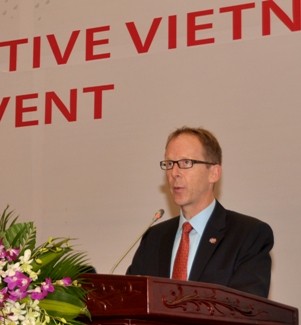
HANOI, August 14, 2013 -- It is my pleasure to join you to discuss the importance of our collaboration through USAID’s Health Policy Initiative.
We have come a long way. USAID began supporting HIV/AIDS programs in Vietnam in the mid-1990s. USAID and its U.S. Government partner agencies work in collaboration with and through the Government of Vietnam at the national, provincial, and district levels in support of the National HIV/AIDS Strategy. USAID supports delivery prevention, care and treatment services, and advocacy for policies that will improve access to and the quality of HIV/AIDS services.
Our extended reach through funding under the U.S. President’s Emergency Fund for AIDS Relief (PEPFAR) includes 11 primary and more than 50 sub-partners. But HPI is unique in its focus on improving HIV/AIDS laws, policies, and programs through a multi-sectoral approach involving a range of partners, including central and provincial government agencies, civil society organizations, and international organizations.
We will hear today how HPI’s implementer Abt and these partners worked on policy advocacy and development, HIV/AIDS services, and use of data to make informed decisions on HIV programs and budgets at the provincial level. I am convinced that HPI has had an important role. A successful response to a complex challenge depends on the environment for action, the capacity of the actors, and the quality of the information driving decisions. HPI addressed all those factors.
International experience shows that adopting evidence-based policy is one of the best ways to ensure an effective and sustainable response to HIV/AIDS. In this regard, I would like to congratulate the Government of Vietnam for the law on HIV/AIDS prevention and control passed in 2006 and for implementation decree 108 of 2007. These are great examples of collaborative development of HIV/AIDS laws and policies and that provide a strong foundation for an effective HIV/AIDS response. More recently, the National Assembly passed the Law on Handling Administrative Violations, which ended the commitment of sex workers to 05 centers and marked a great step forward in developing a public health focused approach to sex work. We look forward to a similar end to what are known as 06 centers.
Overall, much has been achieved in HIV/AIDS policy, but much remains to be done. There continue to be gaps and inconsistencies in laws and policies. HPI helped harmonize the legal and policy framework on HIV/AIDS and the critical areas of drug treatment, sex work and the role of civil society. An inter-ministerial circular on condom provision in accommodation establishments, which is about to be promulgated, is a good example of how ministries and international projects like USAID’s can collaborate on development of sound HIV policies.
The U.S. Government is committed to supporting Vietnam to develop strong, HIV-related laws and policies that ensure that all people living with HIV and AIDS can access antiretroviral treatment, drugs users can access voluntary treatment, and key affected populations can access effective HIV prevention services.
We will review today what has been achieved and what remains to be done in the coming years. The policy development process is often complex and time consuming and requires engagement with the government and participation of all stakeholders, from central to grassroots levels. Many people may think that only high ranking officials working at the central level of government can be policy makers. In fact, policy makers and policy advocates include people living with HIV, people who use drugs, sex workers, outreach workers, other program beneficiaries and community caregivers. We need to ensure that all of their voices are raised and heard in the policy development process. Many journalists are here today, and your voices and roles will be highly influential in the process as well. In fact, the media play a huge role in our effort through HPI and other initiatives to elevate understanding and reduce stigma. Private sector actors also have a tremendous role in moving Vietnam to success on its HIV/AIDS response.
I am proud that HPI has played an instrumental role in our partnership’s achievements to date and we expect that today’s event will help us to understand the importance of maintaining the momentum and commitment to development of a strong, evidence-based, and rights-based legal and policy framework on HIV/AIDS in Vietnam. I thank the team at Abt for their dedication and hard work in delivering this impact.
Thank you/Xin Cam On.







Comment
Make a general inquiry or suggest an improvement.